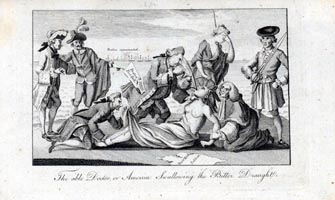The Boston Port Act

The only Coercive Act intended solely as a punitive measure, the Boston Port Act, passed on March 31, 1774, was designed to close Boston Harbor to "the landing and discharging, lading or shipping, of goods, wares, and merchandise," effective June 1, 1774. It also removed all customs officials from Boston to Salem. The preamble claimed the legislation was necessary because "dangerous commotions and insurrections" had been "fomented and raised … by divers ill-affected persons, to the subversion of his Majesty's government, and to the utter destruction of the publick peace."
The penalty for anyone who wanted to test Parliament's mettle was a fairly mild one, especially when compared with the stridency of the language. There were no criminal penalties, which might have been expected, only the forfeiture of any goods that intrepid captains attempted to land in Boston after the port's closure and tripled the damages assessed on any Bostonian found attempting ship goods into the city (Clause I).
The port's closure did not exclude all goods from the city. Military stores were exempt, as was "any fuel or victual brought coastwise from any part of the continent of America, for the necessary use and sustenance of the inhabitants of the said town of Boston" so long as the ships were furnished with a pass and gave themselves up for search by customs officials for contraband (Clause IV).
The stiffest penalty for an infraction created by any of the Coercive Acts was reserved for any imperial or colonial official who "shall, directly or indirectly, take or receive any bribe or reward" to smuggle goods into the city or who helped someone else evade the Act's terms: A fine of £500 — a substantial sum equal to half the typical annual salary for a royal governor — per offense and permanent disbarment from the offender's post (Clause V). On the other hand, the penalty for attempting to bribe such an official was set at a comparatively mild £50.
The Act also set forth that if the Privy Council determined that "peace and obedience to the laws" were restored in Massachusetts Bay, then it had the authority to adjust the act's reach by establishing "open places, quays, and wharfs" within Boston Harbor, free of all commercial restrictions (Clause VIII). But before that could happen, Boston would have to pay the bill for the tea (Clause X).





